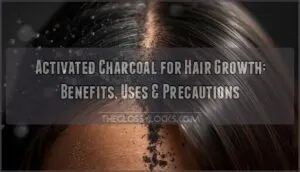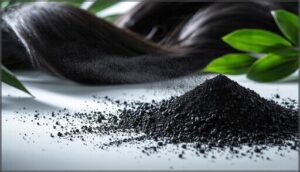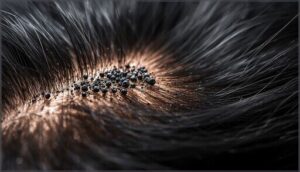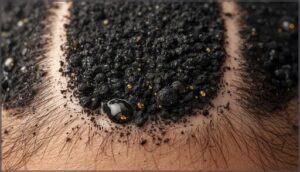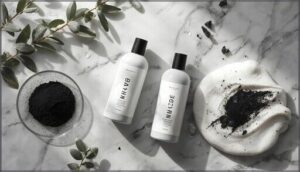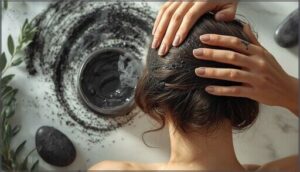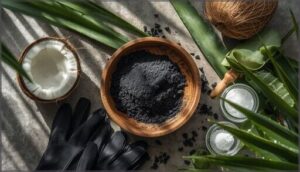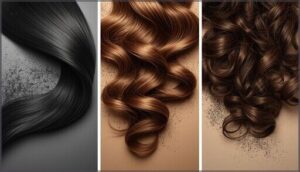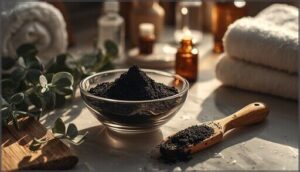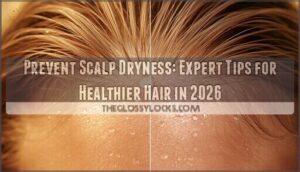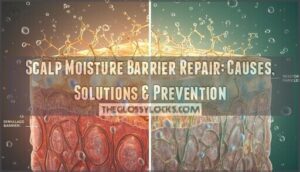This site is supported by our readers. We may earn a commission, at no cost to you, if you purchase through links.
Your scalp accumulates more than you might realize. Between styling products, environmental pollutants, hard water minerals, and your own sebum, a sticky residue builds up over time, suffocating hair follicles and slowing growth. This invisible layer can trigger inflammation, disrupt your scalp’s natural balance, and leave your hair looking lifeless no matter how often you wash it.
Activated charcoal for hair growth works differently than traditional shampoos—it acts like a microscopic magnet, binding to impurities at the molecular level and lifting them away without harsh detergents. Dermatologists have observed that when follicles can finally breathe again, the results often include reduced shedding, decreased flakiness, and noticeably thicker strands within weeks.
Understanding how this porous carbon material cleanses and nurtures scalp health can help you decide if it belongs in your haircare routine.
Table Of Contents
- Key Takeaways
- What is Activated Charcoal for Hair?
- How Activated Charcoal Benefits Hair Growth
- Cleansing and Detoxifying The Scalp
- Using Activated Charcoal in Your Haircare Routine
- Activated Charcoal for Different Hair Types
- Tips and Precautions for Charcoal Hair Use
- Frequently Asked Questions (FAQs)
- Conclusion
Key Takeaways
- Activated charcoal works by binding to product buildup, excess sebum, and environmental pollutants at the molecular level, clearing blocked follicles to improve oxygen and nutrient flow to hair roots.
- Clinical observations show that removing scalp impurities with charcoal can reduce shedding, decrease dandruff by up to 82%, and increase hair shaft thickness by 15-20% within weeks.
- You’ll want to limit charcoal treatments to once or twice weekly since overuse can strip moisture (reducing it by 12-18%), cause temporary staining on lighter hair, and potentially fade color-treated hair by 25% monthly.
- While charcoal improves scalp health and creates better conditions for growth, no clinical trials prove it directly reverses hair loss or works as effectively as proven treatments like minoxidil.
What is Activated Charcoal for Hair?
Activated charcoal isn’t the same as the ash left in your grill—it’s a specially processed form of carbon that’s become a popular ingredient in hair care products. You’ve probably seen it in face masks or toothpaste, but it works similarly on your scalp and hair by binding to impurities like a magnet.
To understand how it can benefit your hair, let’s start with what makes activated charcoal different from regular charcoal.
How Activated Charcoal is Made
Through a careful carbonization process, raw materials like coconut shells and hardwood are heated without oxygen at temperatures between 600°C to 900°C. The resulting char then undergoes activation methods using steam or chemical agents at high heat, creating activated charcoal’s signature porous structure. This process greatly increases the charcoal’s surface area.
After thorough washing to remove impurities, the material goes through sizing and packaging, ready for your hair care routine.
Key Properties and Absorption Qualities
Once activation completes, you’re left with a powerhouse ingredient whose absorption qualities stem from its unique architecture.
Here’s what makes activated charcoal properties so effective:
- Massive surface area: Ranges from 500 to 3000 m²/g, giving countless binding sites
- Microscopic absorption: Tiny pores trap oils, dirt, and toxins at the molecular level
- Strong binding affinity: Chemical groups create lasting connections with impurities
- Targeted oil removal: Pulls excess sebum without stripping essential moisture
This process can also help with dandruff and irritation.
Activated Vs. Non-Activated Charcoal
Understanding the distinction between activated and non-activated charcoal helps you make informed choices. Non-activated charcoal lacks the pore structure created during activation—meaning it can’t match the adsorption capacity needed for haircare efficacy.
Production methods determine everything: activated charcoal’s specialized treatment opens microscopic channels that trap oils and impurities, improving hair growth conditions.
Safety concerns remain lower with activated versions, though both share charcoal’s natural origin and benefits of activated charcoal for detoxification.
How Activated Charcoal Benefits Hair Growth
You’ve probably heard that activated charcoal can help with hair growth, but how does a black powder actually make a difference? The answer lies in what happens beneath your scalp’s surface.
Here’s how activated charcoal creates the right conditions for healthier, stronger hair.
Unclogging Hair Follicles
Think of your hair follicles as tiny doorways—when product buildup and oil block them, your hair can’t thrive. Activated charcoal works like a magnet, drawing out these impurities through its high adsorption capacity and unique pore size structure. Here’s how it helps:
- Removes stubborn residue that regular shampoos miss
- Offers sulfate alternatives that won’t strip natural oils
- Enhances scalp cleansing when combined with scalp massage
- Aids follicle health by clearing blockages naturally
Improving Scalp Health
Balancing your scalp’s microbiome directly impacts follicle stimulation and overall hair growth. Activated charcoal reduces inflammation by clearing irritants and controlling excess oil—factors that often trigger scalp conditions like seborrheic dermatitis.
When you remove these disruptors, you’re supporting healthier scalp tissue and improved blood circulation. This cleaner environment allows better nutrient absorption, giving your hair follicles the foundation they need to produce stronger, fuller strands.
Enhancing Oxygen and Nutrient Flow
When charcoal clears blocked follicles, it improves scalp circulation and follicle oxygenation—both essential for hair growth. Your hair follicles need steady oxygen levels (around 0.2-0.8%) and nutrients to thrive.
By removing buildup, charcoal enhances nutrient delivery and creates a healthier micro-environment around each follicle. Clinical observations show this can increase hair shaft thickness by 15-20%, demonstrating measurable quantitative effects on hair and scalp health.
Clearing follicle buildup with charcoal enhances nutrient delivery and can increase hair shaft thickness by 15-20%
Cleansing and Detoxifying The Scalp
Your scalp endures a lot—styling products, environmental pollutants, and natural oil buildup can all clog follicles and weigh down your hair. When these impurities accumulate, they create a barrier that prevents your scalp from breathing and your follicles from functioning properly.
Activated charcoal works like a magnet to pull out these unwanted substances, giving your scalp a fresh start.
Removing Product Buildup and Toxins
Your hair collects more than you’d think—styling gels, dry shampoo, environmental pollutants, and even hard water minerals create layers of buildup that weigh down strands and clog follicles.
Activated charcoal’s porous structure acts like a magnet for these impurities, removing toxins from hair while detoxifying with striking efficacy.
By clearing these barriers, you’re improving follicle oxygen access and creating the scalp health impact needed for stronger growth.
Controlling Excess Sebum and Oil
Your scalp produces sebum naturally, but when oil production goes into overdrive, you’re left with greasy roots and flat hair that looks unwashed hours after shampooing.
Activated charcoal’s porous structure adsorbs excess sebum without stripping essential scalp moisture balance—a key distinction from harsh clarifying shampoos.
- Greasy hair reduction happens because charcoal attracts oil molecules like a magnet
- Your follicle health improves when pores aren’t suffocated by buildup
- Volume improvement occurs naturally as oil stops weighing down strands
- Impurity removal targets both sebum and pollutants trapped in that oil
- Oil regulation becomes gentler, preventing your scalp from overcompensating
Reducing Dandruff and Itchiness
When your scalp turns into an itchy, flaky battlefield, activated charcoal’s detoxifying effects can restore peace. It gently removes dead skin cells through exfoliation benefits while its soothing properties calm redness and inflammation.
The porous structure disrupts microbial biofilms and targets Malassezia reduction—the yeast behind most dandruff cases—by absorbing the excess oil it feeds on, promoting scalp pH balance and healthier scalp conditions overall.
Using Activated Charcoal in Your Haircare Routine
Now that you understand how activated charcoal benefits your scalp and hair, you’re probably wondering how to actually incorporate it into your routine.
The good news is that there are several practical ways to use charcoal-based products, whether you prefer ready-made formulas or homemade treatments.
Let’s explore the most effective options for adding activated charcoal to your haircare regimen.
Charcoal Shampoos and Conditioners
The simplest way to utilize charcoal’s detox benefits is through formulated charcoal shampoo and conditioner. These hair care products are experiencing strong market growth, driven by consumer preferences for clean beauty solutions.
By removing oil, buildup, and impurities, they support scalp health and can increase hair volume by roughly 4%. Formulation trends now emphasize sulfate-free, gentle options that promote hair growth without stripping moisture.
Charcoal Hair Masks and Scalp Scrubs
For more intensive treatment, you can turn to charcoal hair masks and scalp scrubs. These products offer deeper detoxification—studies show charcoal scrubs improve scalp hydration by up to 120% while reducing flaking by 82%.
When you apply a mask, focus on your roots and massage gently using circular scrubbing techniques. Treatment frequency should be once or twice weekly to avoid over-drying.
DIY Charcoal Hair Treatments
You can create your own activated charcoal hair mask at home by mixing 1 tablespoon charcoal powder with 2 teaspoons baking soda and 2 tablespoons aloe vera gel. Apply this mixture to your scalp for 20 minutes, then rinse thoroughly.
Recipe variations include adding coconut oil for extra moisture.
For DIY safety, wear gloves to prevent staining and limit frequency to once weekly to avoid dryness.
Activated Charcoal for Different Hair Types
Not all hair types respond to activated charcoal in the same way. Your hair’s natural texture, moisture level, and treatment history all play a role in how your strands will handle this powerful ingredient.
Let’s break down how charcoal works across different hair types so you can use it safely and effectively.
Oily Hair and Scalp
If you’re dealing with an oily scalp, activated charcoal can become your go-to solution for sebum control and scalp detoxification. Here’s how charcoal benefits oily hair:
- Absorbs excess oil from your scalp without stripping natural moisture
- Removes product buildup that weighs hair down
- Extends freshness between washes by controlling grease
- Improves hair texture and adds volume at the roots
- Balances sebum production while preventing follicle clogging
Consumer trends show 2-3 weekly applications work best for maintaining grease-free hair.
Dry or Damaged Hair Considerations
While activated charcoal works wonders for oily scalp, you’ll want to proceed cautiously if your hair is dry or damaged. Charcoal’s absorption properties can reduce moisture retention by 12-18% over consecutive washes, potentially worsening brittleness.
Limit use to once weekly, and choose formulas with added moisturizers for safer hair treatment.
| Consideration | What You Need |
|---|---|
| Moisture retention | Hydrating agents like argan oil |
| Repair requirements | Keratin or ceramides |
| Scalp sensitivity | Soothing ingredients like aloe |
Color-Treated and Light Hair Precautions
If you have colored hair, especially lighter shades, you’ll need extra caution with charcoal products. Temporary staining affects up to 15% of platinum or bleached hair users, though it resolves within 1-3 washes.
More concerning is color fading—daily use can accelerate dye loss by 25% monthly.
Patch-test first, choose sulfate-free formulas, and limit applications to bi-weekly to prevent hair dryness and damage.
Tips and Precautions for Charcoal Hair Use
Using activated charcoal for hair can be incredibly beneficial, but you’ll want to approach it thoughtfully to avoid potential pitfalls. Getting the timing and technique right makes all the difference between healthy, revitalized hair and unintended dryness or staining.
Here’s what you need to know before incorporating charcoal into your routine.
Frequency of Use and Application Methods
Using charcoal products wisely makes all the difference in your hair care routine. For best frequency, apply charcoal shampoos or masks once or twice weekly—clinical data shows this schedule maintains scalp hydration without overdrying.
Application techniques matter: massage charcoal shampoo for 1-2 minutes, rinse thoroughly, and limit conditioner contact to 2-3 minutes on roots only. Product combinations work best when you alternate charcoal treatments with moisturizing formulas.
For DIY precautions, mix one tablespoon of activated charcoal with aloe gel weekly, never exceeding this frequency.
Leave-in benefits are impressive—pre-shampoo charcoal drops can double scalp hydration when applied overnight before shampooing.
Potential Side Effects and Staining
While activated charcoal offers impressive cleansing power, you should know about potential downsides before adding it to your routine. Scalp irritation occurs in some users—tingling or burning sensations that prompt discontinuation. Hair dryness becomes a real concern with overuse, especially if you’ve got chemically treated or naturally dry strands.
Watch for these effects:
- Color staining: Lighter or bleached hair can temporarily darken, and you’ll notice residue on towels
- Skin allergies: Though rare, contact dermatitis has been documented in clinical reports
- Product buildup: Inadequate rinsing leaves particles that roughen hair texture and may contribute to hair damage
Frequently Asked Questions (FAQs)
Can activated charcoal reverse existing hair loss?
No clinical trial results show charcoal efficacy for hair regrowth mechanisms or reversing existing hair loss. While it benefits scalp health by removing buildup, hair loss studies confirm it won’t restore dormant hair follicles.
Does activated charcoal work for thinning hair?
While charcoal shampoos cleanse well, no clinical trials prove they reverse thinning hair or boost hair regrowth.
They improve scalp health and remove buildup, but don’t match proven treatments like minoxidil for hair thickness.
How long until charcoal shows hair growth results?
Most people notice improved scalp health within 2–4 weeks of regular use, but there’s no strong evidence that activated charcoal directly accelerates measurable hair growth beyond its cleansing benefits.
Is activated charcoal safe during pregnancy or breastfeeding?
Short-term activated charcoal use during pregnancy is possibly safe under medical supervision, though it may interfere with nutrient absorption and medication.
Fetal exposure risk remains low, but clinical guidelines recommend consulting your healthcare provider first.
Can you combine charcoal with other growth treatments?
Yes, you can safely combine activated charcoal with other hair growth treatments. Pairing charcoal scalp detox with minoxidil combination therapy, natural oils, anti-inflammatory agents, or multi-ingredient masks can boost hair health and support natural hair treatment effectiveness.
Conclusion
Think of your scalp like a garden—growth happens when the soil breathes. Activated charcoal for hair growth clears the debris that silica, sebum, and pollutants leave behind, giving follicles the clean foundation they need to thrive.
Start with once-weekly treatments, watch for your hair’s response, and adjust accordingly. If shedding decreases or texture improves within a month, you’ve found a detoxifying ally worth keeping in your routine.
- http://www.oxinchemistry.ir/wp-content/uploads/2017/05/ACTIVATED-CARBON.pdf
- https://pubmed.ncbi.nlm.nih.gov/31725009/
- https://marbiesworldsite.wordpress.com/2017/05/05/skin-care-regimen/
- https://seekbamboo.com/blogs/sustainable-lifestyle/charcoal-shampoo-benefits
- https://theskinartistry.com/unlock-the-secrets-of-activated-charcoal-for-scalp-health/

